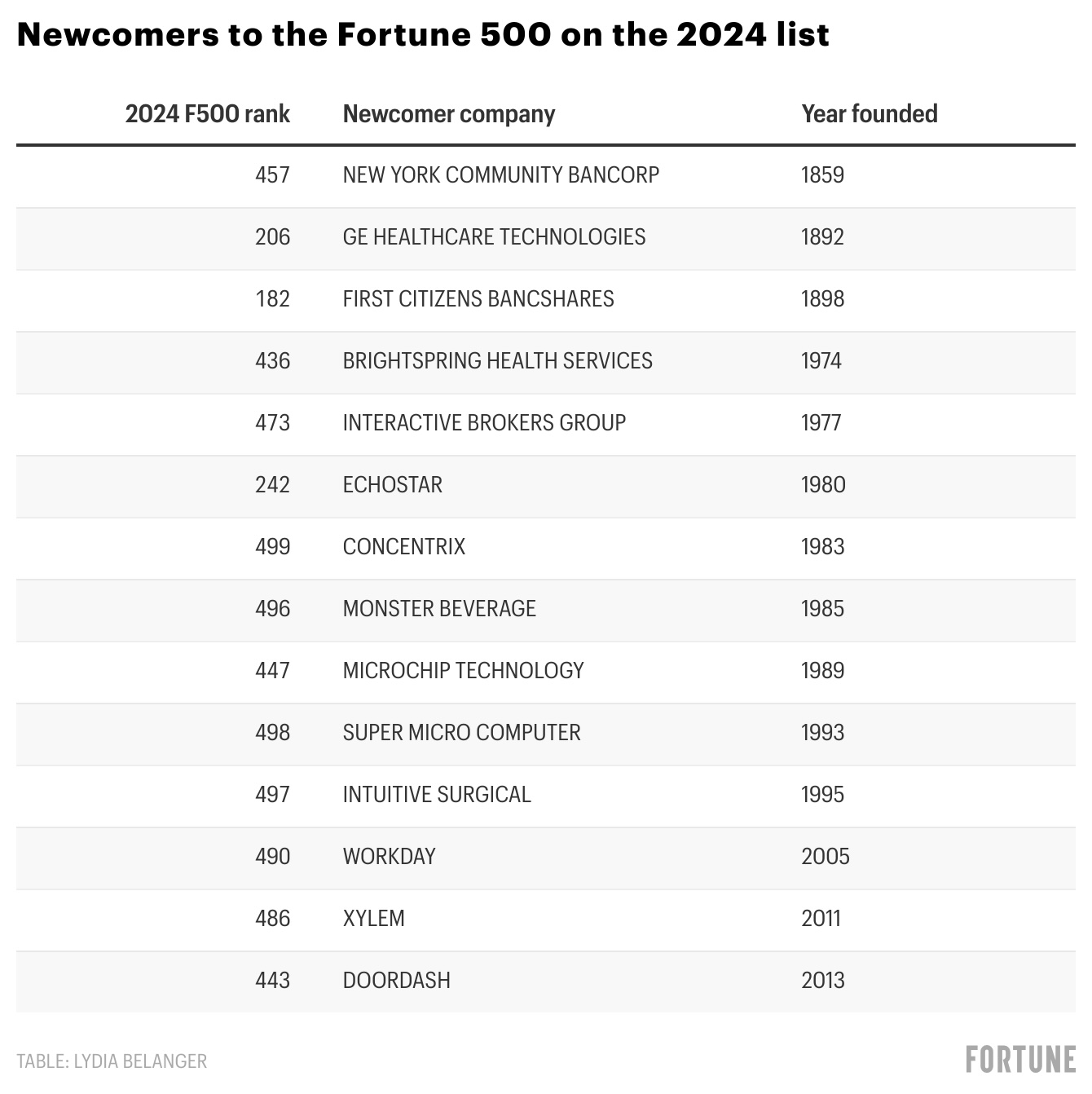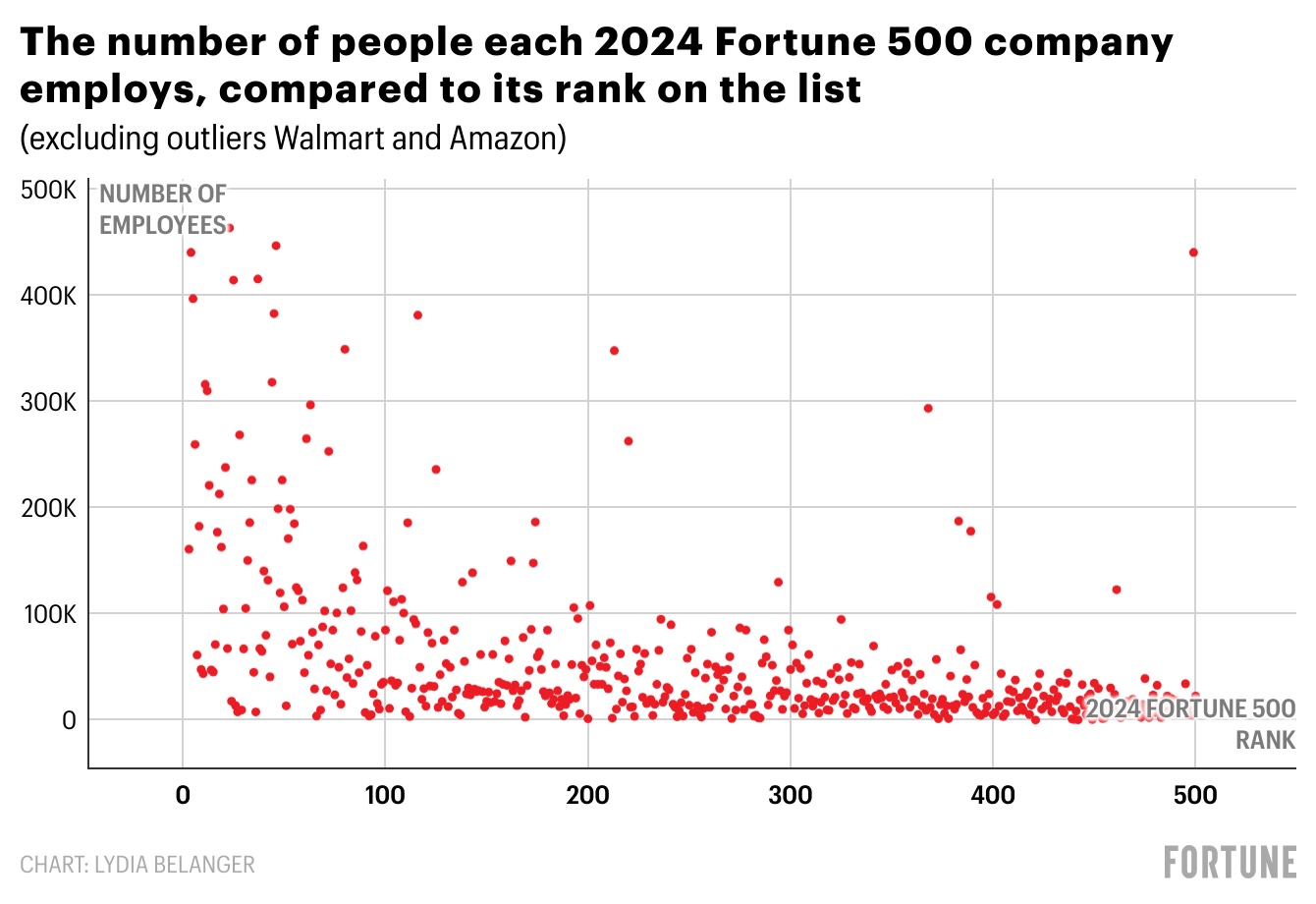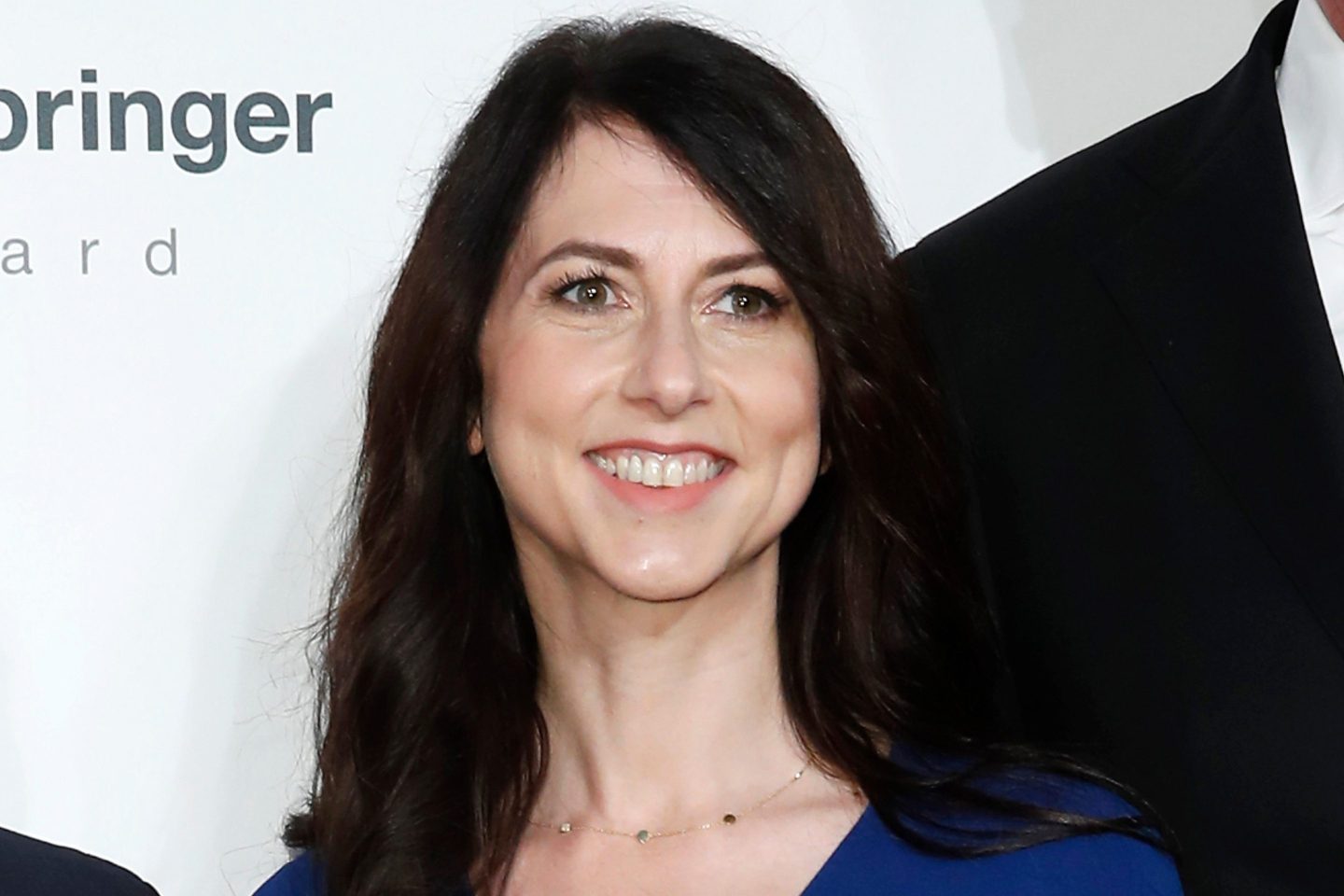Earlier this year, 14 companies made the Fortune 500 list for the first time. The idea of a Fortune 500 debut may conjure images of fast-growing tech startups or otherwise nascent corporations. But not all of the ranking’s newcomers fit that profile.
The youngest of this year’s first-time companies, delivery platform DoorDash, was founded in 2013. It entered the Fortune 1000 at No. 769 in 2021 and rose at a steady clip to make the 500 three years later (today, it’s No. 443). Gig economy peers Uber and Airbnb had joined the Fortune 500 ranks in 2020 and 2021 respectively.
The oldest member of the Class of 2024, meanwhile, has been around for more than a century and a half: New York Community Bancorp (No. 457), founded in 1859.
This is one of those juicy Fortune 500 facts that, at first pass, seems unintuitive. But indeed, a company that’s been around for 165 years only now has a high enough revenue to crack the Fortune 500, while it took DoorDash just a decade.

As past editions of this newsletter have underscored, to view any part of the Fortune 500 in a vacuum is to limit your understanding of the list and why it has shaken out the way it has over time, let alone in any given year. The methodology of the list has changed over the years; companies that were not eligible in the list’s first few decades (and in many cases could not have existed, given societal and technological constraints) now dominate the ranking. The Fortune 500 lineup is also a reflection of the economy, so while some sectors are timeless, others rise to prominence because of shifts in consumer demand, policy, or both, because those are often intertwined.
The numbers to know
83… The average age in years of a Fortune 500 company in 2024.
3… The age in years of the youngest 2024 Fortune 500 company, GXO Logistics (No. 402), created in a 2021 spinoff.
250… The age in years of the oldest 2024 Fortune 500 company, Molson Coors Beverage Company (No. 352), founded in 1774.
39… The number of newcomer companies on the 2021 Fortune 500, which was the first year to capture the impact of the COVID pandemic and the new players it vaulted up the ranking.
16… Fortune 500 companies employ more than 300,000 people worldwide.
73… Fortune 500 companies employ more than 100,000 worldwide.
10… Fortune 500 companies employ less than 2,000 worldwide.
28… The number of people that VICI Properties, No. 804 on the Fortune 1000, employed at the time the 2024 list was tabulated—a lower total than any other company on this year’s list.
The big picture
Many factors influence whether a company is a high revenue generator, and age has little to do with it. Some companies lose relevance after many years; others hit their stride decades into their existence. Many companies surge or plummet due to some sort of M&A deal or other activity. Forty-nine companies have been on the Fortune 500 all 70 years.
Revenue, of course, is what the Fortune 500 measures, first and foremost. And while it’s useful to note which companies excel based on other metrics, such as profits and market value, it’s not a given that high revenue goes hand in hand with those markers. One could assume these business basics, but the relationship, if any, between a company’s age and Fortune 500 ranking—or its number of employees—is less obvious.
It’s also worth noting that the methodology behind our list sometimes treats “new” companies like old ones. Case in point: GE Healthcare Technologies, which joined the Fortune 500 this year at No. 206. On paper, that company is about as new as it gets: It was spun off from General Electric in January 2023. But in cases involving spinoffs, Fortune traces the new company’s date of birth, so to speak, back to the founding of the parent company. And the original GE dates back to 1892.
Deeper takeaways
A merger explanation
The newcomer to the list this year that ranked the highest was EchoStar, at No. 242. That company wasn’t even on the Fortune 1000 the year prior. It also had the biggest percentage gain in revenue of any company on the list this year, at 752% year over year.
A major leap like this usually can be explained by only one thing: A big deal. In this case, EchoStar acquired DISH Network, which it had long done business with, in 2023. DISH was No. 249 in 2023, but it fell off the list this year due to the fact that it is now a subsidiary. DISH’s revenue on the 2023 Fortune 500 was just under $16.68 billion. EchoStar’s on the 2024 list was about $17.02 billion.
Back in 2013, EchoStar landed on Fortune’s Fastest-Growing Companies list; it was No. 689 on the Fortune 1000 that year. The 2024 version of that list will publish in about a month, and today, it is no longer confined to the Fortune 1000. Of course, Fortune examined EchoStar’s profits to determine its placement for the Fastest-Growing list back then; our researchers were not forecasting the merger by any means.
Employee count vs. rank
As the infographic above shows, there is a slight correlation between a higher Fortune 500 rank and a larger number of employees, but plenty of lower-ranking companies employ more people than their higher-ranking counterparts. Walmart and Amazon (with 2.1 million and 1.525 million employees, respectively) do not appear on this scatter plot; on a chart big enough to include them, the other data points would become difficult to read. (The companies support this correlation, though, as they rank No. 1 and No. 2, respectively.)
The bottom line: Headcount does not necessarily translate to greater revenue or earnings. Plus, a company’s total number of employees may not account for contractors, third-party vendors, consultants, or other associates that bolster the business.
This marks the last installment of my summer-long run bringing you stats and history about the Fortune 500 universe, in commemoration of the 70th edition of our flagship list. Thanks for reading. But keep an eye out for more ad hoc analysis via this email list in the future. And if you loved our dives into the print magazine issues and Fortune 500 lists of yesteryear, subscribe to the weekly Fortune Archives newsletter, published every Sunday.
--
Lydia Belanger
Director of Production, Fortune
lydia.belanger@fortune.com














